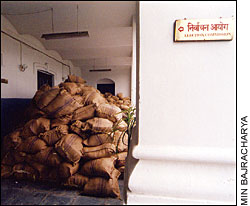 The Election Commission's verdict on Tuesday may have given the Girija Prasad Koirala faction of the Nepali Congress the party flag and the tree symbol, but it wasn't much of a victory.
The Election Commission's verdict on Tuesday may have given the Girija Prasad Koirala faction of the Nepali Congress the party flag and the tree symbol, but it wasn't much of a victory. After sitting on the dispute for four months, apparently deliberately, the EC came out with such a wishy-washy verdict that it evoked ridicule. And instead of resolving the dispute once and for all, so parties can now get down to serious campaigning, it has stretched the uncertainty by another week by allowing the Sher Bahadur Deuba faction to register a new party. In fact, the controversy will linger even after the elections, because the EC said that its decision was not final.

Now, the real question is: what if the elections can't be held on 13 November?
The Maoists have been picking off potential UML candidates in the districts one by one. "They have attacked some of our most popular cadres in the districts," the UML's Raghu Panta told us. "It has forced us to ask whether they are sincere about talks." The Maoists have killed over 65 UML workers.
The Congress has lost more, and other political parties have also been targeted. According to the human rights group INSEC, the Maoists have so far killed 184 political workers.
"As a believer in democracy I cannot say no to elections," says Hirdaya Ram Thani, former Congress MP from Surkhet. "But it will be impossible to go beyond the district headquarters to canvass for votes if the security situation does not improve."
Legally, after finalising the preliminaries, the EC needs 40 days to hold elections. But the security forces have said that they need at least six phases, possibly even as many as eight, which could stretch the elections over three months. And yet, as a senior minister told us, "Politics does not matter anymore. We've reached a stage where the security forces may be deciding how and when to hold elections."
Last week police chief Pradip Sumshere Rana touched a raw nerve after articulating what security agencies thought was the ideal way to go. Based on an earlier assessment, that involved holding elections in 150 constituencies in five phases to leave more time for the remaining 55.
The uncertainty lingers, and in thi scenario, the worst motives are ascribed to the king, irrespective of whether he decides to invoke Article 127 to try to take the country back to absolute monarchy, as some fear he might, or works with the government to devise a constitutional way out of the stalemate.


